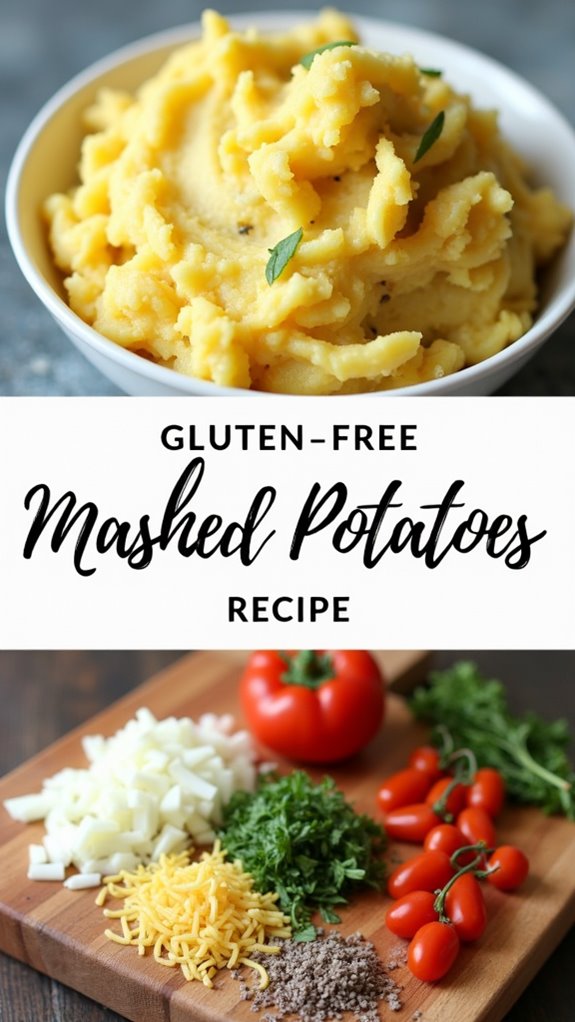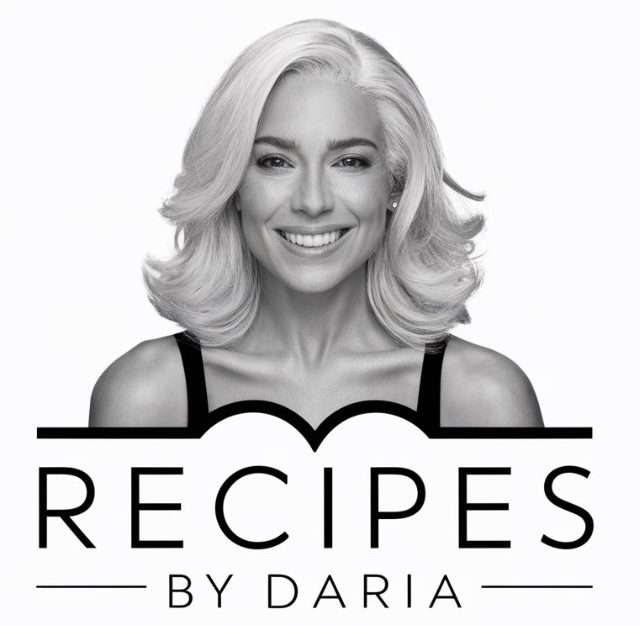Gluten-Free Mashed Potatoes Recipe
Gluten-Free Mashed Potatoes Recipe
If you’re looking for a creamy, satisfying side dish that fits a gluten-free diet, gluten-free mashed potatoes are an excellent choice. They’re simple to make and can be customized to your taste with ingredients like cream cheese or Parmesan. First, you’ll need to prepare the potatoes properly to achieve that perfect texture. Let’s explore the steps and tips for creating this comforting dish that pairs well with a variety of meals.
Why You’ll Love This Recipe
If you’re looking for a delicious side dish that everyone can enjoy, you’ll love this gluten-free mashed potatoes recipe. Not only are potatoes naturally gluten-free, but they also provide numerous nutritional benefits. Potatoes are gluten-free starchy vegetables, making them safe for individuals with celiac disease or gluten intolerance.
They’re rich in complex carbohydrates for energy and high in vitamin C, which supports your immune system. Potatoes contain potassium, helping regulate blood pressure, and vitamin B6, essential for brain function. With fiber included, these mashed potatoes promote digestion and keep you feeling full. Plus, the recipe is versatile, allowing you to customize it easily for various dietary needs.
You can make it dairy-free or choose different potato types, ensuring it fits your taste. Enjoy a tasty, healthy side dish that everyone can safely savor!
History
Mashed potatoes have a rich history that stretches back centuries, showcasing their journey from humble beginnings to a beloved dish worldwide.
The Incas enjoyed mashed potatoes long before Europeans discovered them. When sailors brought potatoes from the Andes to Europe in the 16th century, they faced skepticism. In fact, France banned them as food in 1748.
However, Antoine-Augustin Parmentier changed that perception after his experiences of survival on potatoes during imprisonment. By promoting potatoes’ nutritional benefits, he helped remove the ban in 1772 and popularized mashed potatoes. Potatoes became easier to grow than traditional staples, allowing them to spread across Europe and become a staple food, especially in Ireland.
Today, mashed potatoes continue to evolve, adapting to various tastes and dietary needs, including gluten-free versions.
Recipe

Ingredients:
– 2 lbs Russet or Yukon Gold potatoes
– 1/2 cup whole milk or unsweetened almond milk
– 4 tablespoons salted or unsalted butter (or dairy-free alternative)
– Salt, to taste
– Pepper, to taste
– 1 teaspoon garlic powder (optional)
– Grated Parmesan cheese (optional)
Cooking Instructions:
- Begin by peeling the potatoes and cutting them into evenly sized chunks or cubes. This will guarantee that they cook uniformly. Gluten-free mashed potatoes are a great option for those with dietary restrictions.
Place the cut potatoes in a large pot and cover them with cold water. Add a generous pinch of salt to the water and bring it to a boil over high heat.
-
Once boiling, reduce the heat to medium and let the potatoes cook for about 15-20 minutes, or until they’re fork-tender. You can test them by piercing a potato with a fork; it should slide in easily.
-
After cooking, drain the potatoes thoroughly in a colander and rinse them with warm water to remove excess starch. This step helps achieve a smoother mash.
-
In a large mixing bowl, use a potato masher or hand mixer to mash the potatoes until they reach your desired consistency.
For ultra-smooth potatoes, a hand mixer works best, but be careful not to overmix, as this can make them gummy.
- Gradually add the warmed milk and melted butter to the mashed potatoes, continuing to mash until well combined.
Adjust the amount of milk and butter to achieve your preferred creaminess.
- Season the mashed potatoes with salt, pepper, and garlic powder, if using.
Taste and adjust the seasoning as needed. For an extra touch, you can fold in grated Parmesan cheese for added flavor.
Extra Tips:
To guarantee your mashed potatoes are as smooth and creamy as possible, reheat the milk and butter before adding them to the mashed potatoes.
This prevents the potatoes from cooling down and helps maintain a warm, velvety texture.
Additionally, if you want to experiment with flavors, consider adding cream cheese for a richer taste or mixing different types of potatoes for a unique texture.
Enjoy your gluten-free mashed potatoes as a delicious side dish that everyone can savor!
Final Thoughts
When preparing gluten-free mashed potatoes, you’ll find that they can be a delightful addition to any meal, providing a creamy texture and comfort.
They’re not only delicious but also offer impressive health benefits. With just 80 calories per serving and 0g of total fat, they fit well into a balanced diet.
Potatoes are known to reduce inflammation, help with digestion, and even contain tryptophan for a calming effect. Additionally, a stable network connection is essential for optimal use of food-related services and applications, ensuring you can access recipes and tips when needed.
When you follow the right preparation techniques, like gentle mashing and proper seasoning, you’ll achieve that fluffy texture everyone loves.
Remember to serve them warm and consider adding a bit of butter on top for extra flavor.
Enjoy your comforting dish, knowing it’s both tasty and nutritious!
FAQ
Have questions about making gluten-free mashed potatoes? You’re not alone!
First, stick to Russet potatoes for that creamy texture. Remember, potatoes are naturally gluten-free.
When it comes to milk, you can use whole milk, half-and-half, or even almond milk for a dairy-free option.
To avoid gummy potatoes, don’t overmix when mashing. Salt the boiling water to enhance flavor, and try adding garlic powder for a tasty twist.
If you want a silky texture, mash while the potatoes are hot. If your potatoes turn out watery, cut them into larger chunks next time.
Finally, always season well to prevent blandness. Enjoy creating delicious, gluten-free mashed potatoes!
